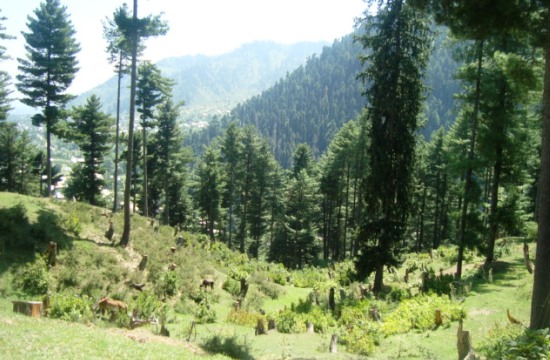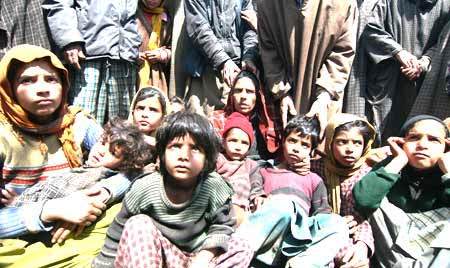Timber smuggling is a lucrative but risky business. Many young men have lost their lives while smuggling timber. Hamidullah Dar explores the factors that lead men to put lives at risk for a living.

Gull Mohammad Kalis and Farooq Ahmad Khan had many things in common. Both had nine children each, smuggled timber for a living, died violent deaths. Both died at 40, though five years and 100 kilometres apart.
Khan, a resident of Brari Aangan Islamabad was killed by police in May 2005 while smuggling timber from a nearby jungle on a horse. More recently on April 24, troopers of 3 RR, who had laid an ambush for militants, opened fire on seeing human movement in a Pulwama forest killing Kalis of Batafojan, Pulwama. The incident reiterated the risk timber smugglers run in carrying out the illegal occupation, which has cost many smugglers their lives.
A few families live in Batafojan, a small village on the slopes of Chowan hills, including six brothers of slain Kalis along with their wives and 36 children. All the men in the village smuggle timber for a living. Mohammad Shafi Kalis is the elder brother of slain Gul Mohammad, “We do not have anything to fall back upon. Not even cattle. What else can we do other than getting timber and selling it,” he says, “We are extremely poor with large families to feed. Almost all the people living in this strip extract timber from forests for livelihood.”
It was the 27th and Gull’s family was observing the fourth day of his death. Many people had gathered at his house to offer condolences. One of them was Manzoor Khatana.
“We even reside on forest land as we do not have any land of our own. If the government stops timber smuggling we will make charcoal and sell the same. We cannot think of working away from our homes due to the situation in the area,” said Manzoor without disclosing the name of his village.
Most of the people in the gathering don’t see timber smuggling as a bad thing, though they know it is illegal. “We are a petty lot, who eke out a living from forests. Just see how ministers are looting and embezzling crores of rupees without any accountability,” adds Manzoor.
Despite official claims of restrictions on timber smuggling, this reporter posing as a customer saw trees axed in large numbers in the Malwan forests in Kulgam district. About 30 youth and middle-aged men were cutting trees in the middle of a forest. All axe-wielders were busy with their work, at ease chatting, laughing.
At intervals, a group of four would take a break for smoking Hukka. One of them was Rashid (name changed) from Chhambagund. Tall, robust and talkative Rashid has no apprehensions of the forest protection force personnel. “You will get timber at your doorsteps. All the consignment will be safely ferried as we have already paid for one week to the forest officials in the way,” he said.
His associate Hassan (name changed) said “government has arranged sufficient manpower for the protection of forests but they are almost all corrupt that does not leave anything to be afraid of.” There are three roads that lead to the forests at Malwan, Bangimulla and Chanderi. All are manned by forest officials who put up in rented houses at the entry points. But according to Rashid, “They take Rs 500 per pony and do not come in the way.”
Almost 20 of the axe-wielders said that it was poverty that brought them to this occupation. One of them shouted “We are poor people and had no option. Dr Farooq did a commendable job by appointing smugglers as forest guards but when they got a regular salary, they stopped taking risks. Even the ponies they left were taken to use by their children or other relatives.”
“We fetch about Rs 6000 per pony load of timber and in a month usually one person extracts 15 pony loads of timber,” said Rashid. Starting from penury these smugglers have turned into money minting machines not only for themselves but for forest officials as well. “You see Rangers are travelling in buses and their subordinates have Santro and Wagon R cars. Wherefrom does this money come,” questions Hassan.
Illegal timber extraction from forests has been going on for decades. However, with the onset of militancy, number of people taking up timber smuggling as an ‘occupation’ swelled manifold.
Forester Tariq Ahmad Bhat, who was posted in the Shopian belt during early 1990’s says, “The near absence of government in 1990 turned entire population of the areas living near forests into smugglers. Vast stretches of the forest cover were shaved within months.”
Low economic activity, popular greed and the virtual absence of government gave rise to timber smuggling cartels, throughout Jammu and Kashmir.
“When troopers and militants were engaged in fierce battles, these people were looting forests. And those who could not reach the forest area themselves, got it done by smugglers and in this way a large number of men took it (timber smuggling) as their occupation,” says Bhat.
Rafiq (name changed) is a timber smuggler from Aarigotan village in south Kashmir’s Kulgam area. He has been in the illegal business for the last 15 years. “I got involved with the job (smuggling) during the time when Ikhwanis (a government-backed militia) held sway. I was not employed, so I went to the forest with four other friends and started axing the trees,” Rafiq reveals. “Today I have connections up to DFO level and I pay forest officials regularly. My party has 40 members now and we ferry timber on 60 horses at a time,” says Rafiq.
Rafiq’s gang is active in the forests around the Veshav river.
Besides other laws, timber smugglers can be booked under Public Safety Act, a controversial law mainly targeted at political opposition, which provides for jailing a person for up to two years without trial. They also carry the risk of running into ambushes laid by troopers and many young timber smugglers have paid with their lives, mostly being mistaken as militants.
The risky job offers easy money, which lures many young men into the occupation. Rafiq, however, cites different reasons for people resorting to felling trees and timber smuggling. “Poverty, unemployment, lack of avenues, easy availability of timber and corrupt officials who promote it for their personal gains,” says Rafiq without a pause.
Forester Bhat disagrees. He does not see poverty and unemployment as the major reasons behind timber smuggling. “Poverty is not always the case. Many timber smugglers have become used to luxuries and easy money which this risky job offers. For many it has now become a route to riches rather than earning a livelihood,” he says.
The latest satellite imagery puts forest cover in Jammu and Kashmir at much lesser than many other Indian states. Large scale timber extractions by the government, loot by the erstwhile forest lessees, government-backed gunmen and security forces have all played a part in the degradation of Kashmir forests. The small-time smugglers are a festering mess.

South Kashmir’s Shopian area boasted of a thick pine forest cover just two decades ago. Vast stretches of forest cover in the area have vanished over the years. Locals of many have villages around Mughal Road have turned forests into maize fields. In Sedow area, the number of smugglers is believed to be the highest in the entire south Kashmir.
This reporter met a group of smugglers who had delivered smuggled timber at Tachhloo village and had come to receive payment. On being asked why were they indulging in illegal activity, one of the smugglers, requesting not to be named said, “In a rich and prosperous area like Shopian we are an unlucky lot. We do not have any orchards or any other source of income, so we resorted to extracting timber from the forest.”
They have evolved, he says, a mechanism to deal with the forest officials. “It is a risky business and we walk in scores so that if confronted by officials we can defend ourselves (by fighting it out). Sometimes we pay the officials and resolve the issue on the spot.”
They alleged that the forest officials posted in the area have accumulated huge wealth due to the heavy timber smuggling in the area.
Interestingly, some smugglers offer naive justifications for indulging in the illegal trade. “No doubt we steal a national asset but don’t take it all to our homes. Government is unable to provide timber to the people so we fill the gap. If we are not there, poor people will never dream of building a house. I think it is a noble occupation,” says Muneer (name changed) of Malwan in Kulgam district.
However, in the last few years, the forest department has launched drives against timber smuggling. Forest officials raid under-construction houses to check whether the timber being used has been procured legally. These actions have made using smuggled timber much more risky business.
In the Chitergul area of Islamabad district, the smugglers now provide finished products like doors and windows and not the logs of wood which earlier used to be the case.
“The pressure from the young forest officials has given smugglers a run. Now they take orders and supply windows and doors that just are to be fitted in the building,” says Ilyas Laway of Soarnag.
Anyway, the loot continues costing Kashmir its forest cover and occasionally young able men.















